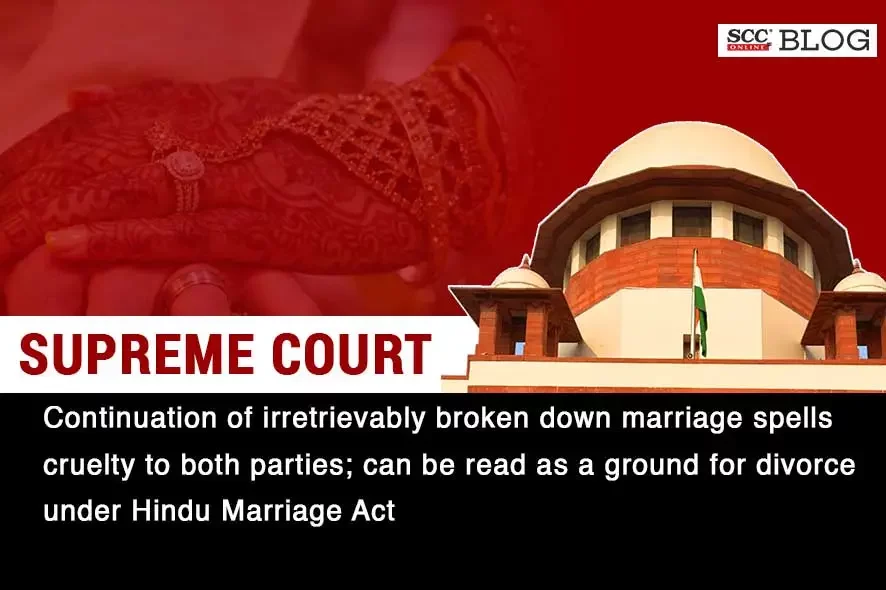Supreme Court: In a case where a married couple, who after barely staying together as a couple for four years, have been living separately for the last 25 years, the bench of Sudhanshu Dhulia* and JB Pardiwala, JJ has held that in such cases where the marital relationship has broken down irretrievably, where there is a long separation and absence of cohabitation, with multiple Court cases between the parties; then continuation of such a ‘marriage' would only mean giving sanction to cruelty which each is inflicting on the other.
While the Court noticed that Irretrievable breakdown of a marriage is not a ground for dissolution of marriage, under the Hindu Marriage Act, 1955, but a marriage can be dissolved on the ground of cruelty, it further observed that,
“A marital relationship which has only become more bitter and acrimonious over the years, does nothing but inflicts cruelty on both the sides. To keep the façade of this broken marriage alive wouldbe doing injustice to both the parties. A marriage which has broken down irretrievably, in our opinion spells cruelty to both the parties, as in such a relationship each party is treating the other with cruelty. It is therefore a ground for dissolution of marriage under Section 13 (1) (ia) of the Act.”
The observation came in the light of the contextual interpretation of “cruelty” as mentioned under Section 13 (1) (ia) of the Hindu Marriage Act, 1955, which is determined by ‘human conduct' and ‘behavior” in a matrimonial relationship.
It was explained that,
Matrimonial cases before the Courts pose a different challenge, quite unlike any other, as we are dealing with human relationships with its bundle of emotions, with all its faults and frailties. It is not possible in every case to pin point to an act of “cruelty” or blameworthy conduct of the spouse. The nature of relationship, the general behaviour of the parties towards each other, or long separation between the two are relevant factors which a Court must take into consideration.”
The case before the Court was of a married couple who have barely stayed together as a couple for four years and who have now been living separately for the last 25 years. There is no child out of the wedlock. There have been multiple Court battles between them and repeated failures in mediation and conciliation. The Court found all this a testimony of the fact that no bond now survive between the couple, it is indeed a marriage which has broken down irretrievably.
Having no doubt that the relationship must end as its continuation is causing cruelty on both the sides, the Court expanded the scope of “cruelty” under Section 13(1) (ia) of the 1955 Act and held that,
“The long separation and absence of cohabitation and the complete breakdown of all meaningful bonds and the existing bitterness between the two, has to be read as cruelty under Section 13(1) (ia) of the 1955 Act.”
However, considering the fact that the husband is an employee in Life Insurance Corporation, earning more than Rs.1,00,000/¬ (One Lakh Rupees) per month, the Court directed him to an amount of Rs.30,00,000/- (Thirty Lakh Rupees) to the wife as permanent alimony.
[Rakesh Raman v. Kavita, 2023 SCC OnLine SC 497, decided on 26-04-2023]
*Judgment authored by Justice Sudhanshu Dhulia
Advocates who appeared in this case :
For Appellant(s): Mr. Arvind Kumar Gupta, AOR, Mr. C.Parkash, Adv., Mr. Shrey Tanwar, Adv.
For Respondent(s): Mr. S. R. Setia, AOR







U r articles on law are utmost helpful for 1st semester law students of all universities of India including Guru Nanak Dev University Amritsar Punjab India